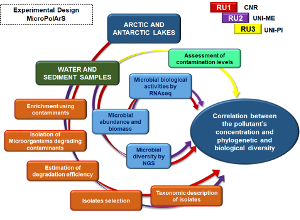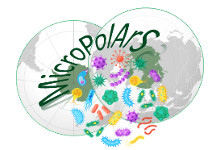 Summary
Summary
Major contaminant transport routes to the Arctic and Antarctica include atmospheric and oceanic transport. Pollutants can be incorporated in drifting ice in the oceanic surface microlayer, and accumulated on the snow and ice surface from the atmosphere. Lakes are widely reported as very sensitive ecosystems to environmental change. This is particularly true in the case of small lakes and ponds that occur extensively in Arctic and Antarctica ecosystems. Small variations in the dynamics and duration of their snow and ice covers or the deposition of xenobiotic substances can have a noticeable effect on lake ecological variables. Microbial communities promptly respond to the environmental perturbations they undergo and their response can be researched in the activation/deactivation of catabolic genes involved in resistance and degradation of pollutants. In this context, the evaluation of microbial community genetic regulation and expression can provide essential and sensitive information related to the potential application of microbes for bioremediation or as biosensors.
Objectives
The primary scientific goal of MicroPolArS is obtaining new information about microbial activities in Polar lakes against pollutants that are present in such sensitive ecosystems. Particularly attention will be paid to the metabolic pathways underlying these degradation processes. To gain an overview of these specific microbial communities and their peculiar activities the following objectives are envisaged:
1) Evaluation of chemical contamination levels and comparison with results retrieved in previous studies;
2) Analysis and estimation of biodiversity and activities of Prokaryotic and Eukaryotic communities, and their distribution in water and sediment;
3) Isolation and characterization of pollutant-degrading and/or HM-tolerant Prokaryotic and Eukaryotic strains, and estimation of their biodegradative activity at low temperatures;
4) Correlation of all results to obtain an overview of the microbial community adaptation and specialization, due to the environmental-pollutant pressure.
Project Partners
• University of Messina, Dept. Chemical, Biological, Pharmaceutical and Environmental Sciences (Messina, Italy)
• University of Pisa, Dept. Chemistry and Analytical Chemistry (Pisa, Italy)
• Cavanilles Institute of Biodiversity and Evolutionary Biology, Dept. of Microbiology and Ecology (Valencia, Spain)
Publications
• Porcino N., Cosenza A., Azzaro M. (2020) A review on the geochemistry of lakes in Victoria Land (Antarctica). Chemosphere 251: 126229. DOI: 10.1016/j.chemosphere.2020.126229
Figures
• F1 - Maria Papale (CNR-ISP) Experimental design







 Title: Microbial response to human Pollutants in polAr lakeS
Title: Microbial response to human Pollutants in polAr lakeS 


